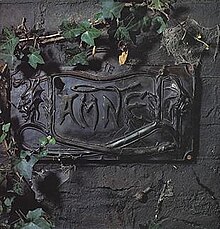The Black Album (The Damned album)
| The Black Album | ||||
|---|---|---|---|---|
 |
||||
| Studio album by The Damned | ||||
| Released | 3 November 1980 CWK3015 | |||
| Recorded | May–June & 26 July 1980 | |||
| Studio | ||||
| Genre | Punk rock, gothic rock, psychedelic rock | |||
| Length | 77:42 | |||
| Label | Chiswick | |||
| Producer |
|
|||
| The Damned chronology | ||||
|
||||
| Singles from The Black Album | ||||
|
||||
| Professional ratings | |
|---|---|
| Review scores | |
| Source | Rating |
| Allmusic |
|
The Black Album was the fourth album by the Damned, and the first to feature Paul Gray on bass guitar.
It was released in 3 November 1980 on Chiswick as a double album, with "Curtain Call" filling the whole of side 3, and a selection of live tracks recorded at Shepperton Studios for Damned fan club members on side 4.
The song "13th Floor Vendetta" paid tribute to the film The Abominable Dr. Phibes (1971), opening with the lyrics "...the organ plays to midnight on Maldine Square tonight".
The Black Album represented a change in the career of the group and an expansion of their sound. AllMusic critic Ned Raggett noted that "some of the numbers show the band following their original punk vein, but by this point the four...were leaving straight, three-chord thrash to the cul-de-sac revivalists", and that it was "a chance for the band to try everything from straightforward rock to gentler atmospherics". Raggett described "Wait for a Blackout" as a "dramatic psych/punk surge" with "overtly-serious goth affectations", and qualified "Drinking About My Baby" as "goofy but still enjoyable". Captain Sensible later said that Dave Vanian's vocals were moving to a darker direction, and stated "It is goth; we didn't set out to do that but that is just the way it is. He did have a hearse, he was a grave digger".
The Damned's Chiswick back catalogue was acquired by Big Beat in 1981, and The Black Album was reissued in August 1982 as a single album that omitted "Curtain Call" and the live tracks. The artwork for the reissue parodied the sleeve of the Beatles' The White Album, rendered in black with no details other than the group's name embossed in capitals. "It was said that the Beatles had their White Album, we had our Black Album", said Vanian. "The sleeve isn't related to the Beatles in any way". However, Scabies said: "Of course it was to do with the Beatles, I was so sick about the debates of what we should have on the front of it. I said: 'Put the thing in a plain black sleeve and we'll have a go at the Beatles and The White Album'". The live tracks were reissued in their own right, with four extra tracks, as Live Shepperton 1980.
...
Wikipedia
